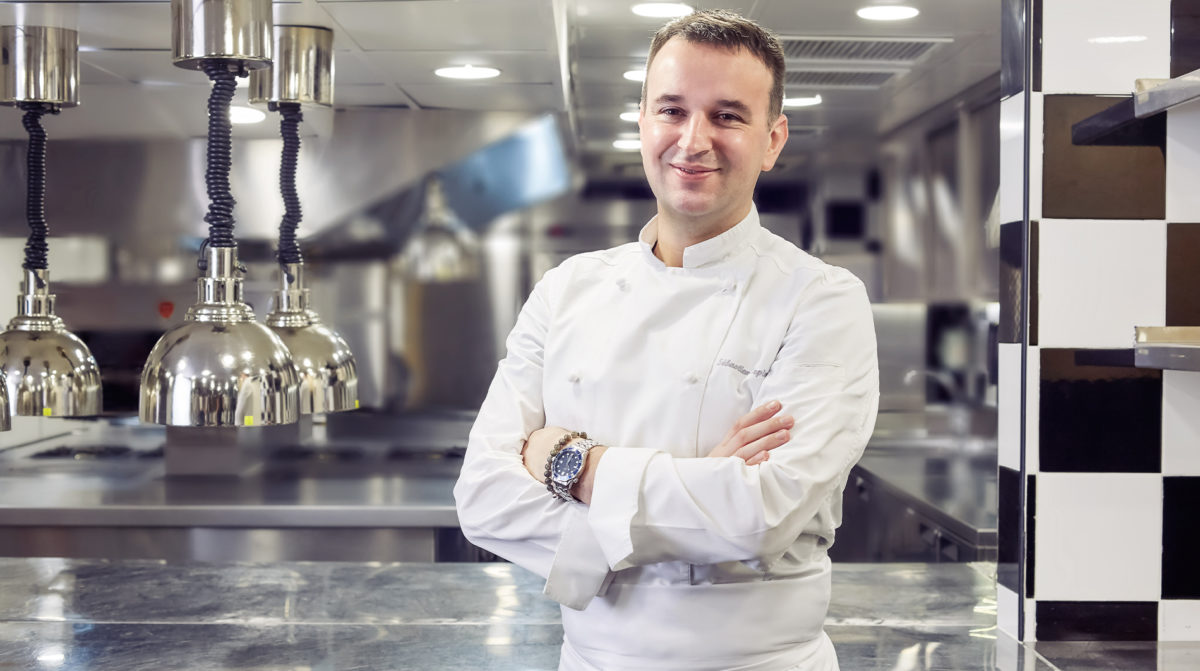

Even though Chopard tapped Sebastien Lepinoy of Les Amis in Singapore to be the first chef to represent the luxury jeweler, he rebuffs the “celebrity chef” title. “I’m not looking to become a celebrity,” Lepinoy says. “I’m looking to become a better professional.”
That singular focus is what propelled Les Amis to be one of only two restaurants in the country to earn Forbes Travel Guide’s highest distinction in its 2020 Star Awards: a Five-Star rating.
Opened in 1994 as one of Singapore’s first independent fine-dining restaurants, Les Amis serves classic French cuisine in an interactive experience that includes everything from bread and ice cream trolleys rolling over to your table to truffle and cheese masters who come by to make recommendations. Lepinoy — who worked under Joël Robuchon before taking over Les Amis in 2013 — considers himself a guardian of the French culinary arts in Asia.
We met up with the decorated chef at ARIA Resort & Casino in Las Vegas while he was in town for the recent Verified, The Forbes Travel Guide Luxury Summit to celebrate his inaugural honor. Lepinoy shared why he wishes there were more Five-Star restaurants in Singapore, where he wants to dine during his first Vegas trip and the one place left on his culinary bucket list.
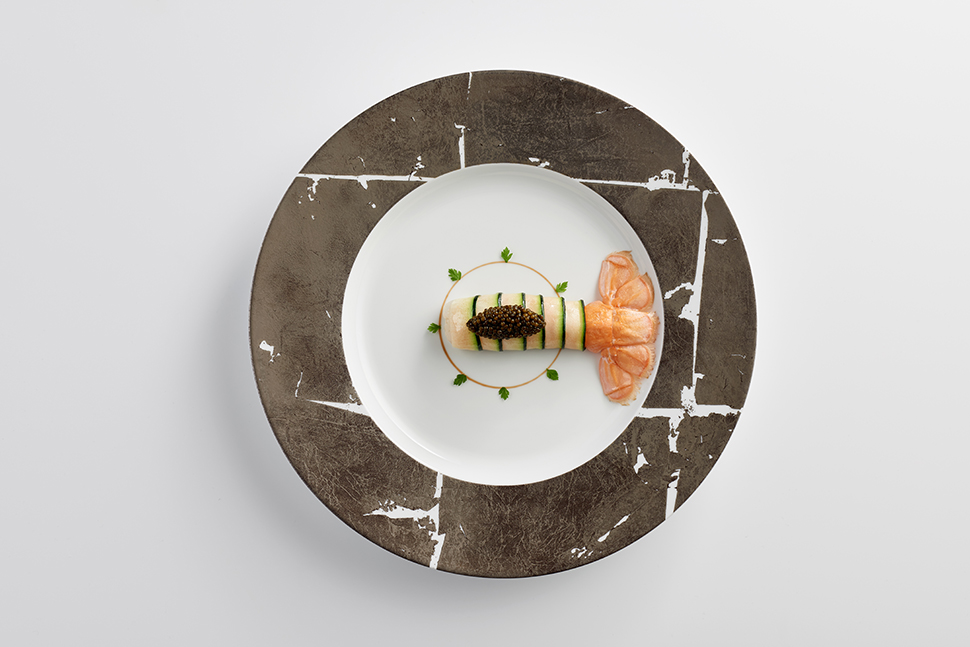
When you first found out you won the Five-Star award, what was your reaction?
I was really, really happy. Because, you know, Five Stars for me was five years of fight to win this.
Before I arrived at Les Amis restaurant, I didn’t really know about Forbes and the Five Star for restaurants. Usually it’s more known when you work in a hotel, but I never worked in the hotel industry… When I arrived in Singapore, Les Amis had Four Stars. I was like, “Okay, nice, Four Stars is good.”
Then I saw the first report from Forbes, and I was so impressed by all of the details — what [the incognito inspectors] did check, where we were no good, where we were good. I said, “Okay this is the base where we must work and we must do it.”
We didn’t have, at that time, an internal training program. I said, “Okay, we will create our own program of training,” and we worked hard. But it was not important to catch a Five Star first. I wanted to improve for our guests. What I find fantastic is that everything [with Forbes Travel Guide’s ratings] is for the guest.
We trained a lot, first internal, then we asked Forbes’ training department two years later to come and to train us also. It was important for us to have some advice from professionals who can help us to go, I will say, faster.
It was the same time I was fighting also for the two Michelin star, and I said, “We have to fight for better service.” Because I believe a good restaurant is 50 percent from the kitchen and 50 percent from the service.
Of course, it took time, but the media and our customers saw improvements. I said, “We are on a good [path] to achieving Five Stars one day.”
How does it feel to be one of only two Five-Star restaurants in Singapore?
It’s good and not good. Frankly speaking, I wish to have more Five-Star restaurants in Singapore. When you don’t have a lot of Five Stars, I’m a little bit scared that we’ll say, “Okay, we have good service,” and that’s all — no.
I prefer more Five Star restaurants in Singapore because I wish for a little more competition to make sure we improve. We must still train because in [food and beverage] there’s always turnover of staff. We cannot say, “Okay, Five Stars is enough.” We’ll try to get six stars [Laughs].
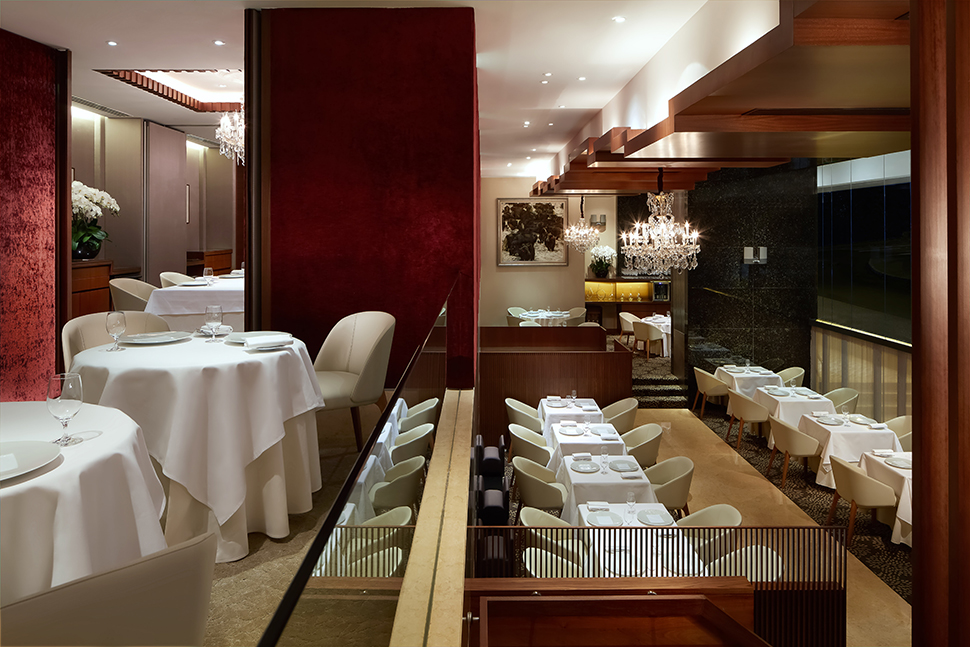
Okay, we’ll create a new category for you.
Yes! Yesterday, I heard about the restaurant The Inn at Little Washington — 30 years of Five Stars [editor’s note: it is Forbes Travel Guide’s longest-running Five-Star restaurant]. I find this beautiful. Thirty years to maintain this high standard — I think it’s not easy. I’m sure every day you have to think that nothing is achieved; we must come back and do it again and again.
How have you seen fine dining evolve over the years?
Service In the last 20 years in Europe and Asia was going down. The chef, the owner didn’t care enough about service. That’s why when I arrived at Les Amis seven years ago, and then when I saw Forbes’ [rating reports], for me it was different.
My cuisine is so classic. It’s not something fashionable. For my cuisine, I need great service. And to have great service, I need professionals who work with me who are able to explain and know everything.
You don’t always feel comfortable, particularly in Asia, where the people are a bit more shy than the U.S., for example. And our service team has a crucial job: to go make sure [customers] are comfortable. Because for some of them, it’s the first time they will spend such a big amount of money, maybe when they invite for the first time a fiancée or someone they want to impress.
We say, “Okay, we will have an exceptional dinner, but the service must give an exceptional time to them.” Because not only the food will be important, but the time and how they will feel [are important, too].
One way you empower your service staff is by sending them to France. Tell us more about that.
It is very crucial to send our staff to France for a few reasons. One of the reasons is to have knowledge. In Asia, they don’t have the knowledge of the cheese. The first guy we sent to be a cheese master. This knowledge will help him with the service.
The big difference between the U.S., Europe and Asia is how the staff is confident with the customer. For example, last night we were here in a restaurant in the hotel and the service staff is very confident, very sure of themselves. They come, they talk with us. But in Asia, it’s not the same. They are much more shy.
Sometimes they are not confident in themselves. We send them in France to train them not only to serve this, but to be a master — some are masters in cheese, some are masters in truffles, some are masters in caviar.
If you have a staff, you cannot just say, “Be confident.” Then how to make them become confident? Some staff have been to universities, Cornell, Swiss [hospitality] schools — they are naturally confident because they have high education. But some of our staff didn’t have this opportunity, so we make them a master of these ingredients.
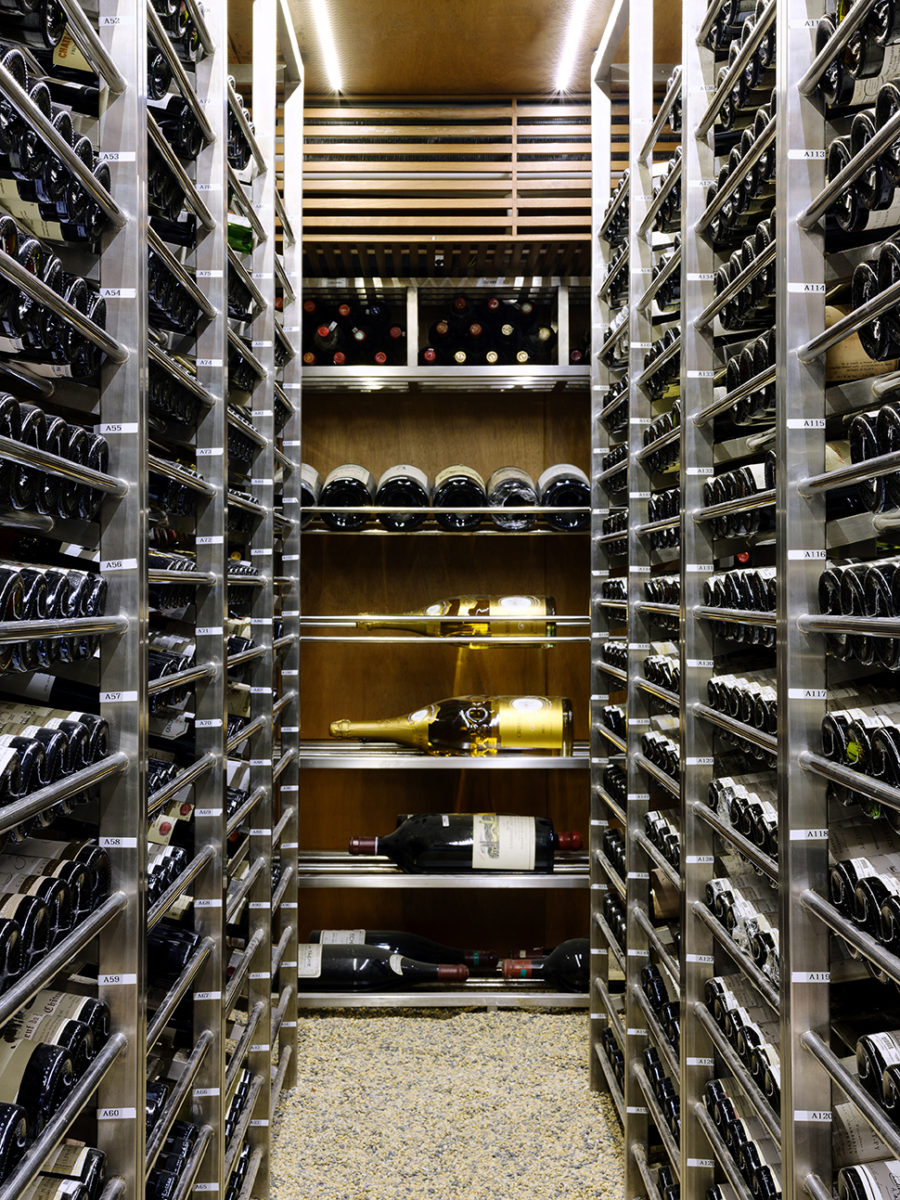
What is the future of fine dining?
There will always be fine dining with proper service. I don’t think it will be finished in 10 years. There will always be space for a proper restaurant that take cares of the heritage of the service. [For example,] not many restaurants have the proper receptionist.
We have some people who save money for one year to come for a birthday or a really special occasion. When they call, sometimes they feel a little bit shy. They are not in their comfort zone to call this type of restaurant. And when they call, they do not dare to ask, “Can I have a birthday cake?” Our job is to have a receptionist who is very well trained who will ask, “Are you celebrating a special occasion?” The person can say, “Yes, it’s my birthday.” Already they will feel they will have a special meal. Already the experience starts.
It’s something that is a classic base of the receptionist job, but in fact it’s not so easy to find because many restaurants don’t care. They care more about the image, what they will serve. They will give a show, but they don’t care about the small details, which make a difference, I think.
What’s one thing you do at the restaurant that makes the experience special for guests?
We try to give an experience of food and service. With the food, we are confident in ourselves. But that is not enough.
I always compare a restaurant to an airline company. An airline company uses almost the same airplane — Airbus, Boeing, Embraer. If you are first class or business class, if you fly Singapore Airlines or fly United Airlines, the setup is quite good. All of the materials are almost the same, but you always go back to the company that really takes care of you.
And restaurants are the same. You can go to a restaurant where you can get a fantastic meal, every dish was good, but you will go back only if the service is something special.
Because service, at the end, is more important than the cuisine almost. Even if the level of the food is really, really high, you will come back only for the service.
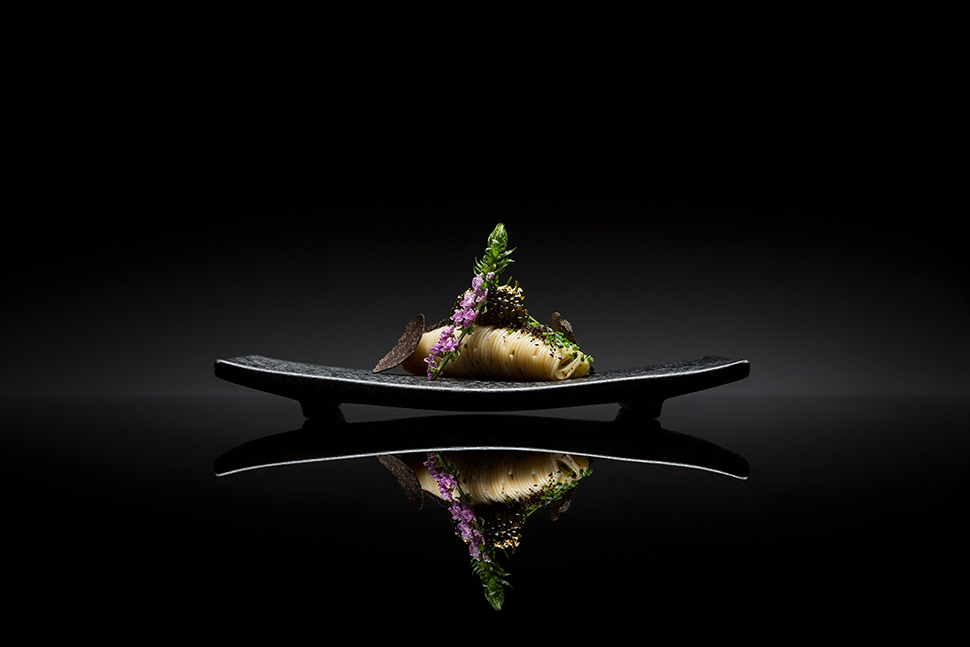
What is your comfort food?
I don’t know if you tried Carbone [at ARIA Resort & Casino]. It is a very good meal. I love this kind of food, just simple Italian food. Everything was perfect — good pasta. And the service was good.
Are there any other restaurants you want to visit while you’re here in Vegas?
We don’t have a lot of time. Tonight we go to Jean-Georges Steakhouse because we heard about it. It’s a very beautiful steakhouse.
Outside of Vegas, what’s left on your culinary bucket list?
I think I’ve done quite a lot. One place I really want to go is The French Laundry. I’ve been a few times to New York but not California.
